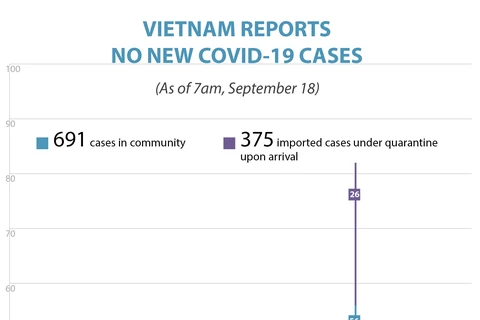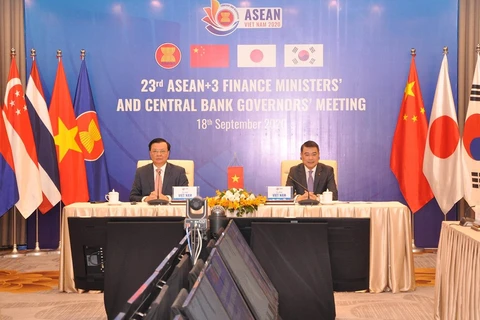 The annual Joint Ministers of Finance and Health Symposium on Universal Health Coverage in Asia and the Pacific was held on September 17 (Photo: VietnamPlus)
The annual Joint Ministers of Finance and Health Symposium on Universal Health Coverage in Asia and the Pacific was held on September 17 (Photo: VietnamPlus)
Hanoi (VNA) – Vietnamese Minister of Finance Dinh Tien Dung has shared Vietnam’s experience and financial mechanisms to cope with COVID-19 pandemic effectively with Ministers of Finance and Health of Asia-Pacific countries during a recent symposium.
The Joint Ministers of Finance and Health Symposium on Universal Health Coverage in Asia and the Pacific, the 53rd of this kind, with the theme “COVID-19 and Beyond”, was held online by the Asian Development Bank (ADB) in Hanoi on September 17, with the participation of various countries in the Asia-Pacific region.
In his speech at the event, which focused on the financial mechanism applied in Vietnam to respond to COVID-19 amid lower State budget revenue, Minister Dinh Tien Dung said Vietnam has prioritised budget funds for preventive medicine.
He noted that the COVID-19 pandemic with complicated and unpredictable developments has greatly affected economies around the world, including Vietnam – a country with high level of openness as well as deep and wide international integration.
Highlighting Vietnam’s strategy of focusing on preventing the pandemic from entering and spreading in the country, he said that the country has spent at least 30 percent of its health care budget on preventive medicine each year.
The minister underlined that, in Vietnam, the State budget covers most public health services, while those for health examinations and treatment are covered by compulsory health insurance. The primary healthcare fee is jointly paid by health insurance, the people, and the State budget, he said, adding that the country is speeding up the restructuring of the State healthcare budget to better care for people, especially those from ethnic minority groups or in mountainous regions, border areas, and islands.
The minister clarified that Vietnam has made use of all locally-available resources for fighting COVID-19. As early as the first cases of COVID-19 were reported in the world, the Government directed ministries and sectors to build response plans, and ensure sufficient funding and human resources for preventive measures, quarantine, and treatment following the principle of four on-the-spot resources. Thanks to the measures, Vietnam has managed to ensure resources for pandemic prevention and control activities.
He stressed that Vietnam has persistently implemented the twin goals of preventing the spread of COVID-19 and removing difficulties for production and business, thus maintaining macro-economic stability, preventing disruption of socio-economic activities, reining in inflation, and ensuring social welfare.
Specifically, a 62-trillion VND package was launched to support people affected by COVID-19, along with reductions, exemptions, and payment extensions on fees and taxes, to ease difficulties for enterprises.
Along with actively stocking up on medical equipment for pandemic prevention and control, administrative procedures were also reformed, while the business environment has been improved.
At the same time, Vietnam also worked to ensure the supply of essential medical supplies and equipment. Import taxes on goods serving pandemic prevention were suspended.
The minister proposed that Health and Finance Ministries of other countries continue to support Vietnam in enhancing the capacity of preventive medicine, while sharing information and experience in treatment and vaccine research, helping the country promote sustainable growth.
“As an active and responsible member of the international community, Vietnam conveys sympathy with pandemic-hit countries and has been working hard to coordinate with them in pandemic prevention and control,” he stated.
“I think that in the current situation, the solidarity and coordinated actions on the global scale will be a foundation to ensure the final victory of the world against COVID-19 pandemic.”
ADB representatives hailed Vietnam’s success in dealing with COVID-19 and securing socio-economic development.
Along with stable macro-economic conditions and inflation under control, the consumer price index has fallen in recent months and the monetary market, credit and foreign exchange basically remained stable./.























